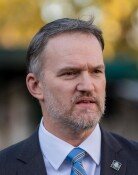Officials from finance ministry and prosecution dominate key posts
Officials from finance ministry and prosecution dominate key posts
Posted December. 30, 2022 07:41,
Updated December. 30, 2022 07:41
It turned out that among the 96 high-ranking government officials at and above the vice-ministerial level appointed by the Yoon Suk Yeol administration, 48 officials, or half were former government officials. They were in several government offices, including the presidential office, the prime minister’s office, and 18 other ministries. This is the result of The Dong-A Ilbo’s analysis of 103 public officials, excluding seven people appointed during the Moon Jae-in administration, such as Han Sang-hyeok, Chairman of the Korea Communications Commission. Some point out that the talent pool of high-ranking officials who lead the government’s decision-making is leaning too much toward specific jobs.
According to the analysis of 29 high government officials at and above the ministerial level, who are deeply involved in making policy decisions, 21 people (72.4 percent) had formerly worked at government ministries or the Blue House. The figure, 43.8 percent in the first round of the Moon administration’s personnel appointments, has significantly increased. Among them, the number of those from the Ministry of Economy and Finance (MOEF) was the biggest. Five people, including Prime Minister Han Duck-soo and Presidential Chief of Staff Kim Dae-ki, had formerly worked for the ministry. Public officials from the MOEF entered key positions across the government, breaking the old practice of them going to economic-related ministries. Deputy Prime Minister for Economic Affairs Choo Kyung-ho is also a former official at the MOEF.
Placing former officials of the MOEF in major government positions has advantages in that they have the strengths in stable management and operation of the economy. However, many are concerned that they will not be active enough in implementing new initiatives or reforms. Many have pointed out that the ministry has created its league based on its practices of retired seniors backing up the juniors. They have contributed to the country’s economic growth, but, at the same time, they have been criticized for still playing the role of the leading economic operators when the private sectors have started to take the lead in the national economy. The exclusive and closed nature of the MOEF gave rise to the term with a bad connotation to describe the ministry, “MOFIA.”
Among high-ranking government officials, former prosecutors who had ties to President Yoon Suk Yeol are showing remarkable strides in their careers. The appointment of former prosecutor Lee Bok-hyeon as the head of the Financial Supervisory Service (FSS) was the first time since the FSS was launched in 1999. Several important public posts under the vice-ministerial level in government agencies, including the presidential office, the prime minister’s office, and the National Intelligence Service, are filled with former prosecutors. This is why people are expressing concerns about the national politics dominated by prosecutors.
If the high-ranking posts are filled by people from specific areas, such as ‘MOFIA’ or prosecutors, it becomes difficult to expect dynamism within the organization. A bureaucratic society will inevitably give birth to social malaises where people with the same background back up each other. It also poses a greater risk of confirmation bias, where government decision-makers only consider the interests of people on their side rather than the public’s perspective. Korea is now in a desperate situation to weather complex global challenges together. We must all stay vigilant to the new politics that the MOEF and prosecutors dominate.







